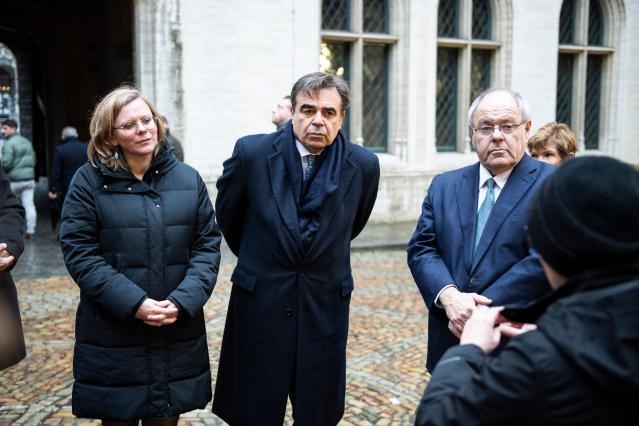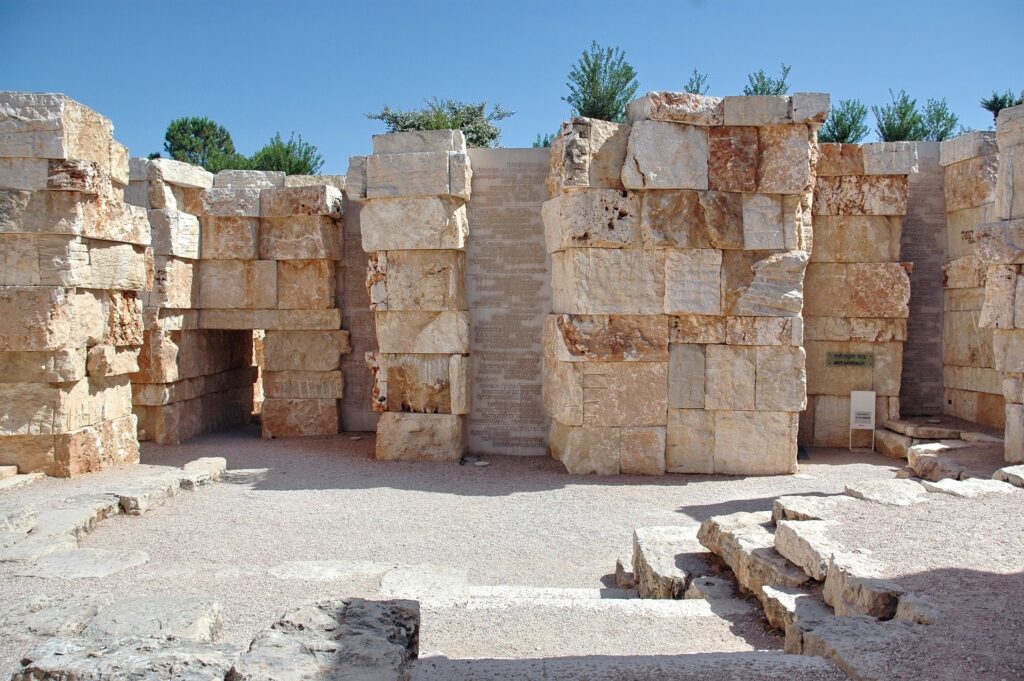The International Day of Remembrance of the Victims of the Holocaust is commemorated this week against the backdrop of a surge in antisemitism in Europe after the 7 October terrorist attack on Israel.
The annual Remembrance Day on 27 January was established by the United Nations in 2005 to commemorate the Holocaust and marks the liberation of the Auschwitz-Birkenau extermination camp by the Soviet Red Army on that day in 1945. The day is commemorated each year by the EU institutions.
The EU condemns Holocaust denial and is calling on more focus on education to learn about the Holocaust, keep the memory alive and counter antisemitism. In October 2021, the EU adopted a strategy on combatting antisemitism and fostering Jewish life in Europe which is currently implemented by the member states.
“I’m proud that we have produced tangible results,” said Margaritis Schinas, Vice-President for Promoting our European Way of Life, at a commemorative event on Tuesday evening under the theme ‘Remembering the past. Shaping the future’. “We are working with the Belgian EU-Presidency and international actors to make a difference in Jewish life in Europe.”
The EU stands by its Jewish citizens, he underlined. Building on the strategy, the Commission also adopted a document in December last year with a call for action to all Europeans to stand up against hatred in all its form, both on-line and off-line, and speak up for tolerance and respect.
At the Commission’s commemoration, organized together with the Belgian EU Presidency and the International Holocaust Remembrance Alliance (IHRA), Margaritis Schinas announced EU funding to a new project aimed at protecting places where the Holocaust and Roma genocide took place. IHRA has recently published a charter for safeguarding the sites.
Concentration and death camps are known sites but many people may not be aware that a site next to them can be linked to the Holocaust, for example a railway station or synagogue from where Jews were deported to the camps. Protecting the sites aim at paying tribute to the victims and raising awareness about the Holocaust.
Never again
Dani Dayan, chairman of Yad Vashem, the World Holocaust Remembrance Center in Jerusalem, receives dignitaries from all around the world pledging ‘Never again’. “My litmus test if they really mean it is if they have implementable and implemented plans to combat antisemitism,” he said at an event on Wednesday organized by the Representation of the State of Hessen to the EU.
Despite the launch of action plans, antisemitism has been on the rise in recent years and is now rampant after the 7 October attack. Are the EU and its member states doing enough to fight antisemitism?
“The EU and the European Commission are doing an important job and we very much appreciate the work of its Coordinator on combating antisemitism and fostering Jewish life,” he told The Brussels Times.
“I tell all EU leaders I meet that while it’s important to say the right words they must also ensure that their words reach all levels and groups in society. EU has become a multi-cultured society and with European citizenship follows also an obligation to denounce antisemitism and accept your Jewish neighbors.”
Hate speech and antisemitic incidents take place in the member states, not on EU level. While the European Commission as the guardian of the EU treaties has passed the test, there are member states that have not yet implemented their actions plans or enforced existing legislation against Holocaust denial and antisemitism. In some countries, the Jewish population lives in fear since 7 October.
Belgium, with its own memory of the Nazi occupation, seems still to be lagging behind. Marie-Colline Leroy, the secretary of state for Gender Equality, Equal Opportunities and Diversity, said that a coordination mechanism composed of federal ministers has been established to speed up actions to prevent antisemitism, especially now when Belgium has taken over the EU Presidency.
Focus on communities
Every year, Yad Vashem chooses a specific theme it wants to highlight when commemorating the Holocaust Remembrance Day. The theme is chosen a year in advance. This time, the Jewish community before WWII is in focus.
The Jewish communities had institutions, schools, political parties and a flourishing culture. “This is a theme which is close to my heart,” Dani Dayan says. “When reflecting on the Holocaust, we think about the genocide of 6 million Jews and remember the names of individual persons who were murdered. But we tend to forget that they lived in communities.”
In the Valley of the Communities at Yad Vashem, over 5,000 names of Jewish communities are engraved on stone walls. Today, in most cases, nothing remains but the name. This memorial will be reconstructed with EU funding.
Yad Vashem is also organizing an exhibition which shows the terrible conditions in the ghettos during the Holocaust where the Jews died due to starvation, epidemics and forced labor until all surviving inhabitants were sent to the death camps. In some places, they managed to revolt or join partisans in the forests but the bitter end was almost always the same.
The exhibition, ‘Flashes of Memory: Photography Creating Perception During the Holocaust’, presents visual documentation of the Holocaust from three perspectives: the perpetrators, the victims and the liberators. It was displayed during the commemoration event at the Representation of the State of Hessen to the EU. At the event, Holocaust denial and distortion in Europe was also discussed.
The memory of the Holocaust is often invoked by politicians in Israel, for examples in relations with other countries that are accused of antisemitism when they criticize the government’s policy. Is there a risk that the legacy of the Holocaust is politicized? “I have often reacted against the misuse of its legacy,” the Yad Vashem chairman replied.
Feeling of helplessness
He reacted when members of the Israeli delegation to the UN were donning Yellow Stars of David during a debate in October after the terrorist attack. “The Yellow Star badges signify a time of helplessness of the Jewish people and being at the mercy of others,” Yad Vashem said in a statement. “Today, we have an independent state and a strong army. We are masters of our destiny.”
While the Holocaust is part of Israel’s national consciousness, Dani Dayan stresses that Israel was not established because of the Holocaust but despite the Holocaust. It was an unprecedented genocide in history and will, hopefully, never happen again. He is reluctant to draw any parallels between the Holocaust and other atrocities.
Still, the murderous attack on 7 October was reminiscent of the Holocaust. During that day, Israel failed the inhabitants in the towns and villages that were attacked and they must have felt the same helplessness as during the Holocaust. Families were burned alive and hundreds of people of all ages were taken as hostages to an unknown fate.
Is it difficult to commemorate the Holocaust Remembrance Day under the shadow of the Israel-Hamas war? “This is the first commemoration of the Remembrance Day after the worst attack against Jews since the Holocaust,” Margaritis Schinas, the Commission Vice-President replied.
“We are approaching the day with a heavy heart but nothing can stop us from remembering and learning the lessons from the darkest period in Europe’s history. We’ll do our best to make the Remembrance Day even more impactful this year.” He participated on Tuesday in a walk tour in the city center of Brussels in memory of the past.
The tour included six stops where Jewish children had been hidden during the Nazi occupation and survived the war. There are no signs at the buildings where they were hiding but information about the places can be found in a new application, IWalk, on AppStore or GooglePlay. The information and interviews with the survivors have been compiled by the House of European History.
The need to remember

Margaritis Schinas surrounded by Marie-Colline Leroy and Dani Dayan at a moment of reflection after the walking tour along hiding places of Jewish children in Brussels, credit: EU
In his speeches, Dani Dayan quotes from diaries written by young people who were murdered in the Holocaust. They had dreams about what they wanted to achieve in life but when all hope was lost, they wanted most of all to be remembered. He is worried about how the Holocaust will be remembered when the surviving witnesses have passed away but he has a ready answer.
Remembrance should be based on four pillars, he explained. The first pillar is mourning but that is not enough to influence people. Knowledge is a second pillar. We owe it to the victims and for the future to know and document everything. Identification, the third pillar, means that all decent people should feel as if they themselves were liberated from the Nazi camps.
The fourth pillar is about lessons learned from the Holocaust. There are many lessons, some of them personal, but he quotes a famous poem about a hand. You can use it to write lyrics or hate speech, to do good or evil, it’s your choice.
“The fight against antisemitism is a fight for Europe’s democracy”, concluded Katharina von Schnurbein, the Commission coordinator against antisemitism. “Never again means now.”
M. Apelblat
The Brussels Time

